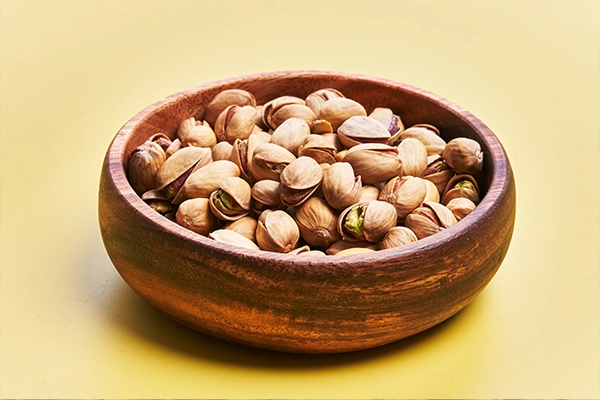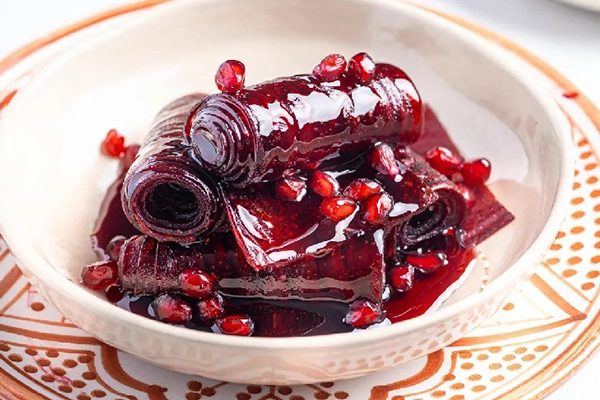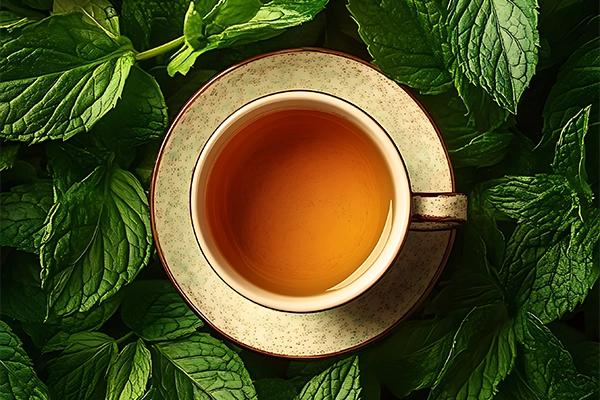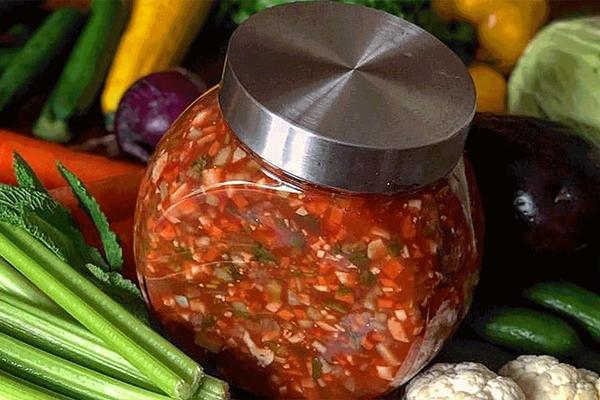Pistachios are among the most delicious and popular nuts worldwide. Beyond their delightful taste, these nutrient-dense nuts offer significant health benefits and can be an excellent addition to a balanced diet. In this article, we’ll explore the calorie content and nutritional profile of pistachios, discussing their health benefits and how to incorporate them into your diet.
Pistachio calories per grams
Whole Pistachios:
In 100 grams of pistachios (with shells), you’ll find approximately 557 calories. This calorie content is substantial for a dried, fatty food item. However, it’s crucial to remember that pistachios are packed with protein, fiber, vitamins, and essential minerals, making them a nutritious choice despite their calorie density.
Pistachio Kernels:
The pistachio kernel (the nut without the shell) contains more calories than whole pistachios. There are about 619 calories per 100 grams of pistachio kernels. This higher calorie content is due to the concentration of healthy fats in the nut itself.
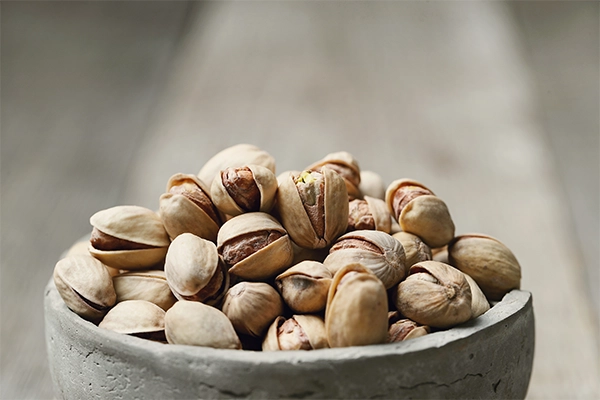
Nutritional Profile of Pistachios
While the pistachio calories is significant, these nuts offer a wealth of nutrients that contribute to a healthy diet:
1. Healthy Fats: Approximately 50% of pistachio calories come from healthy fats, including monounsaturated and polyunsaturated fatty acids, such as omega-3s.
2. Protein: Each 100 grams of pistachios provides about 21 grams of high-quality plant-based protein.
3. Fiber: Pistachios are rich in fiber, with 100 grams containing roughly 10 grams of fiber, which promotes digestive health.
4. Vitamins and Minerals: These nuts are excellent sources of B vitamins, vitamin E, copper, manganese, phosphorus, magnesium, and iron – all vital for various bodily functions.
5. Antioxidants: Pistachios contain antioxidant compounds like lutein and zeaxanthin, which support eye health.
Health Benefits of Pistachios
Despite of high pistachio calories, pistachios offer numerous health benefits when consumed in moderation:
1. Blood Sugar Control: The combination of healthy fats, protein, and fiber in pistachios helps regulate blood sugar levels and may reduce the risk of type 2 diabetes.
2. Heart Health: The omega-3 fatty acids, vitamin E, and antioxidants in pistachios contribute to cardiovascular health, potentially lowering the risk of heart disease and stroke.
3. Weight Management: Although calorie-dense, the protein and fiber content of pistachios promote satiety, which can aid in appetite control and weight management.
4. Immune System Support: The antioxidants and vitamins (particularly vitamin C and E) in pistachios help bolster the immune system.
5. Bone Health: Minerals like calcium, magnesium, and phosphorus in pistachios contribute to strong, healthy bones.
6. Digestive Health: The high fiber content in pistachios supports a healthy digestive system and may help prevent constipation.
7. Brain Function: The combination of B vitamins, vitamin E, and healthy fats in pistachios may support cognitive function and memory.
8. Skin and Hair Health: The nutrients in pistachios, including vitamin E and healthy fats, can contribute to healthier skin and hair.
Incorporating Pistachios into Your Diet
Despite their calorie content, pistachios can be a healthy addition to your diet when consumed in moderation. Here are some tips for incorporating pistachios into your meals:
1. Portion Control: Stick to a serving size of about 1 ounce (28 grams) or roughly 49 pistachio kernels.
2. Snacking: Enjoy pistachios as a nutritious snack between meals to curb hunger.
3. Salad Topping: Add chopped pistachios to salads for extra crunch and nutrition.
4. Baking: Use ground pistachios in baked goods for added flavor and nutrients.
5. Cooking: Incorporate pistachios into savory dishes like pilaf or as a crust for fish or chicken.
6. Nut Butter: Make homemade pistachio butter as a spread or dip.
Buying the best pistachio
When purchasing pistachios, consider the following:
1. Quality: Look for pistachios with intact shells and avoid those with cracks or blemishes.
2. Roasting: Choose unsalted or lightly salted varieties to control sodium intake.
3. Storage: Store pistachios in an airtight container in a cool, dry place. They can be refrigerated for up to six months or frozen for up to a year.
For those seeking top-quality pistachios, Faraz Hypermarket is an excellent choice. This leading chain store offers a wide variety of premium Iranian and imported pistachios at competitive prices. In Faraz Hypermarket’s nuts and dried fruits section, customers can find whole pistachios, shelled pistachios, and even flavored options.
Potential Risks and Considerations
While pistachios offer numerous health benefits, there are some considerations to keep in mind:
1. Allergies: Those with nut allergies should avoid pistachios.
2. Calorie Content: Due to their high calorie density, it’s important to consume pistachios in moderation, especially if you’re watching your weight.
3. Sodium: Choose unsalted or lightly salted varieties to limit sodium intake.
4. Digestive Issues: The high fiber content may cause digestive discomfort in some individuals if consumed in large quantities.
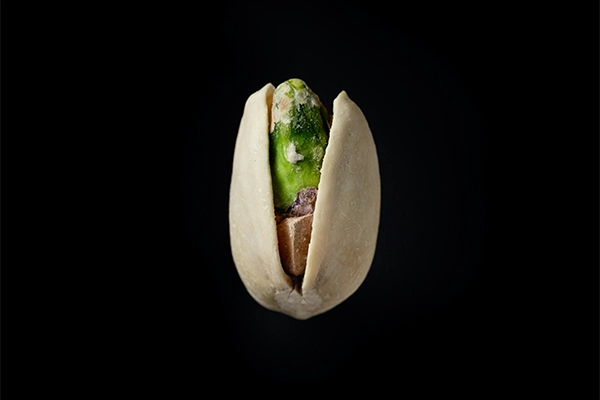
Pistachios in Culinary Traditions: A Global Perspective
Pistachios have been cherished in various culinary traditions around the world for centuries. In Middle Eastern cuisine, they’re often used in baklava, halva, and savory dishes like biryani. Mediterranean cultures incorporate pistachios into pasta dishes, pesto, and traditional desserts. In Indian cooking, pistachios are prized in rich, creamy curries and sweet treats like kulfi. American cuisine has embraced pistachios in ice creams, cookies, and as a coating for meats. Even in East Asia, pistachios are finding their way into fusion dishes and modern interpretations of traditional recipes. This global appreciation for pistachios highlights their versatility and universal appeal, making them a truly international ingredient in the culinary world.
Conclusion
Pistachios are a nutrient-dense food that can be part of a healthy, balanced diet. While pistachio calories is relatively high, they offer a wealth of beneficial nutrients, including healthy fats, high-quality protein, fiber, vitamins, minerals, and antioxidants. When consumed in moderation, pistachios can contribute to various aspects of health, from blood sugar control and heart health to weight management and immune system support. By understanding the pistachio calories and incorporating them wisely into your diet, you can enjoy the delicious taste and health benefits of this versatile nut. Remember to practice portion control and choose high-quality pistachios to maximize their nutritional benefits while managing calorie intake. Whether as a snack, a recipe ingredient, or a salad topping, pistachios can be a flavorful and nutritious addition to your daily meals.
